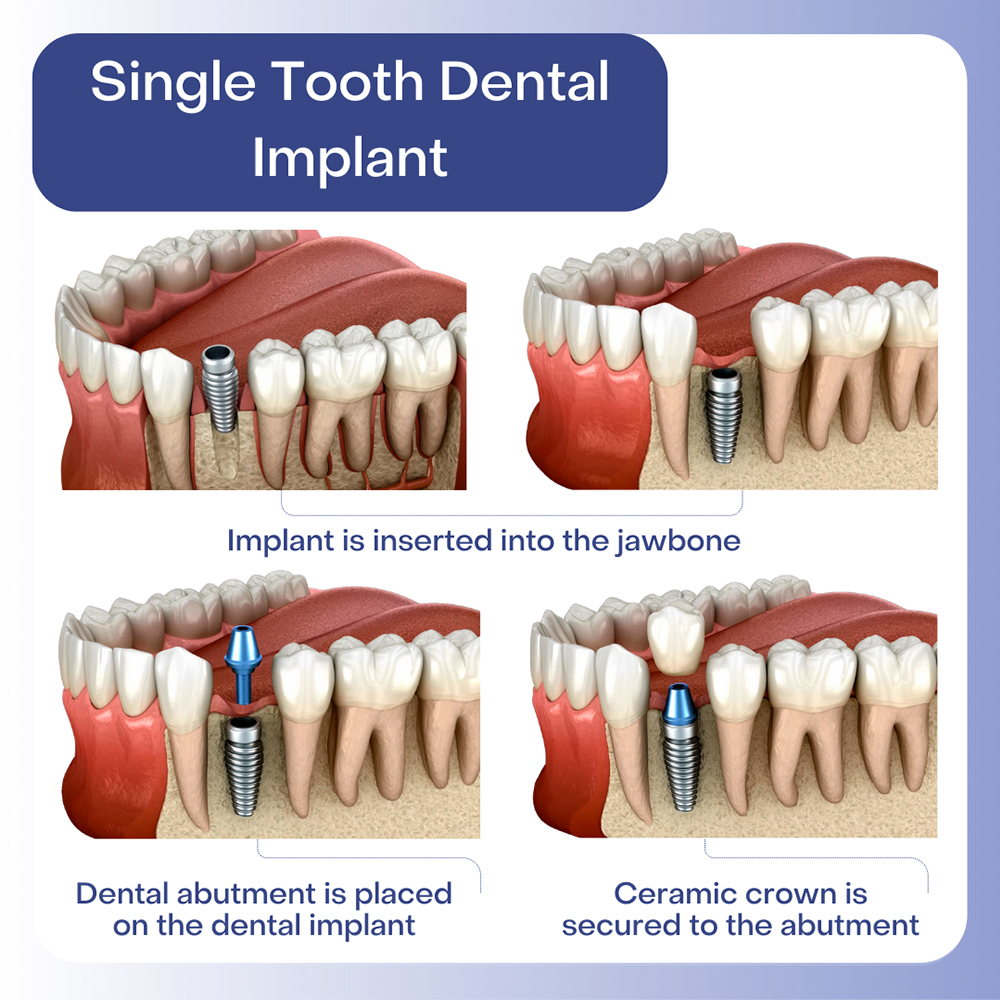The Of Dental Sense
Table of ContentsUnknown Facts About Dental SenseThe Greatest Guide To Dental SenseThe Best Guide To Dental Sense9 Easy Facts About Dental Sense Explained
are medical devices surgically dental implanted into the jaw to restore an individual's capability to eat or their look. They supply support for artificial (fake) teeth, such as crowns, bridges, or dentures. When a tooth is shed as a result of injury or condition, a person can experience issues such as rapid bone loss, defective speech, or adjustments to chewing patterns that result in pain.Oral implant systems are composed of a dental implant body and oral implant abutment and might additionally include a joint fixation screw. Dental implant vs bridge. The oral implant body is surgically placed in the jawbone in place of the tooth's origin. The dental implant abutment is usually affixed to the dental implant body by the abutment fixation screw and prolongs through gums into the mouth to support the connected artificial teeth
Cigarette smoking might influence the recovery process and decrease the long-term success of the dental implant. The recovery procedure for the implant body might take several months or longer, throughout which time you commonly have a momentary abutment instead of the tooth. the dental implant procedure: Meticulously comply with the oral health directions provided to you by your dental provider.
The Of Dental Sense
Implant failing can lead to the requirement for one more procedure to deal with or replace the implant system. Restores the ability to eat Recovers aesthetic appearance Assists maintain the jawbone from diminishing because of bone loss Protects the health of the bordering bone and gums Aids keep surrounding (close-by) teeth steady Improves top quality of life Damage to bordering all-natural teeth throughout implant positioning Injury to the surrounding cells during surgical treatment, such as sinus opening Injury throughout surgery (for instance, crack of bordering jawbone) Poor feature, such as feeling like the teeth do not bite with each other typically An experience that the tooth hangs or twisting in position resulting from an abutment screw loosening up Implant body failure (looseness of the implant body) as a result of systemic infection, which may be more probable in clients with uncontrolled diabetes because of neighborhood infection in bone and periodontals supporting the implant body because of postponed recovery, which may be more probable in patients that smoke Problem cleansing the gum tissues around the dental implant, resulting in bad dental hygiene Neglected gum illness Post-surgical tingling due to nerve impingement or damages Constantly notify healthcare service providers and imaging technicians that you have dental implants prior to any type of magnetic resonance imaging (MRI) or x-ray procedures.
FDA is not familiar with any kind of unfavorable occasions reported for MRI or x-ray procedures with oral implants. Dental implants systems are commonly constructed from products that comply with worldwide consensus requirements of the International Company for Standardization (ISO) or ASTM International. These requirements have information of what makes a risk-free material.

An oral implant is a structure that replaces a missing out on tooth. With screw-like gadgets, the specialist inserts a dental implant into the jawbone, and it acts as a support for a synthetic tooth, called a crown.
The Definitive Guide to Dental Sense
Some individuals are not eligible for dental implant surgery. It is for oral surgeons to operate on individuals with: intense illnessuncontrollable metabolic diseasebone or soft cells condition or infectionIf these problems are resolved, an individual can have the surgical treatment. In, oral doctors refrain from operating on individuals with: If people with any one of the above undertake dental implant surgical treatment, there is a higher threat of the dental implant stopping working.

Dental dental implant surgical treatment is a customized procedure. It's not the very same for everyone. But the following offers a basic introduction of what you can expect your dentist, dental specialist, periodontist or prosthodontist to do: Place the dental implant operatively. Offer you time to heal. Attach the blog post and final crown, bridge or denture.
Next, your cosmetic surgeon will meticulously put the dental implant right into your jaw. If your dental implant is near the front of your mouth, your dentist will make a temporary tooth for you to put on up until you heal.
Rumored Buzz on Dental Sense
Your service provider can tell you what to expect in your scenario. Throughout the recovery phase, your jawbone ought to fuse to the dental implant. This procedure, called you can check here osseointegration, is critical for stability and long-lasting success. This process can take anywhere from 3 to 9 months. Sometimes, it may take longer.
Once your dental implant heals, your dental practitioner can affix the abutment (little port post) and your final repair (crown, bridge or denture). This generally takes regarding one hour to finish and might call for a second small surgical treatment. You should not feel any kind of discomfort throughout your oral implant procedure due to the fact that your service provider will make use of medicine to numb your gum tissues.
Comments on “Dental Sense for Dummies”